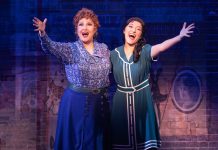The Lonesome West explores the destructive relationship between Valeen (Tom O’Leary) and Coleman (Jason Paulfield), a pair of brothers whose personalities are perpetually at war with each other. Betting his soul on the brothers, the town’s alcoholic priest, Father Welsh, (Conor Walshe) naïvely attempts to reconcile the two enemies. Written by Martin McDonagh, The Lonesome West uproariously showcases its multifarious intricacies through its stellar writing, superb performances and outstanding direction.
McDonagh brings his unrivaled talent for playwriting to The Lonesome West. The smart dialogue dazzles as it engages. Scrutinizing a myriad of topics, including Catholicism, family relationships and greed, the writing has serious undertones to each act, yet the lines are subverted with an air of jocularity. When Valeen and Coleman are solemnly discussing the realms of Heaven and Hell, one of the brothers gravely admits, “It’s always the best ones who go to Hell.” Filled with more hysterical one-liners, McDonagh’s writing combines the profound and the hilarious to create plausible life situations.
As the brotherly duo, Tom O’Leary and Jason Paulfield simultaneously inspire uncontrollable pity and brazen contempt. Quick and snappy, the brother’s retorts sting and sizzle, while their purposefully hollow apologies always fall on wanting ears. Their disparate relationship is best described by Father Welsh’s words: “murder, mayhem and miserliness.” Living up to Father Welsh’s description, Paulfield and O’Leary succeed in recreating the disjointed, yet harmonious kinship of the dueling brothers.
Playing the suffering Father Welsh, Conor Walshe masterfully exemplifies the priest’s prolonged crisis of faith. Haunted by the murders and suicides of his flock, Welsh takes to the bottle, coquettishly admitting that “this parish will drive you to drink.” With Welsh gradually becoming clear-minded in his insanity, Walshe shows Welsh’s madness through his debilitating posture and increasingly melancholy demeanor. Perfect for the role of the priest. Walshe illustrates McDonagh’s issues with Catholicism through internalizing the holy man’s impaired judgment and ill-conceived conclusions.
Thanks to the theater’s “black box” layout, the majority of the audience members do not face the front of the stage. Although this could present an issue with effective direction, Mike Reilly unilaterally conquers the unique stage design. Using every inch of available surface area, Reilly focuses on creating an intimate atmosphere. As a result, the action on stage becomes an alternate reality of the present, and the audience is thoroughly engaged in the play. Victorious in his direction, Reilly discards the sterile interaction between audience and actor, promoting an environment more conducive to interactive play-watching.
In the Ruskin Group Theatre’s rendition of The Lonesome West, the first-class writing and exquisite direction transports the audience to a small village in Ireland, but it is the phenomenal cast that keeps them there. Examining the roles of religion and family in Irish life, the play reveals that even when there is a priest’s soul on the line, there is always a little fight in each of us.
Playing at the Ruskin Group Theatre in Santa Monica, The Lonesome West will continue its run until March 4. Tickets cost $25.
Natalia Evdokimova has been involved with theater throughout her life and has reviewed theatrical productions for local and citywide publications since 2005













